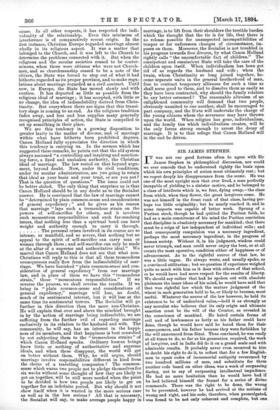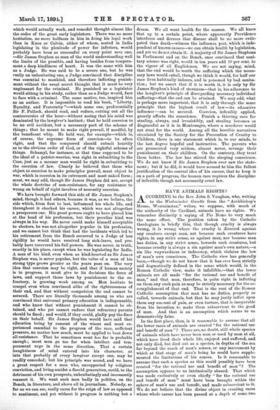SIR JAMES STEPHEN.
IT was not our good fortune often to agree with Sir James Stephen in philosophical discussion, nor could we ever concede that he understood rightly the basis upon which his own principles of action must ultimately rest ; but we regret deeply his disappearance from the scene. He was one of the most upright men that ever lived, a man perfectly incapable of yielding to a sinister motive, and he belonged to a class of intellects which is, we fear, dying away,—the class from which, when they flower, the great lawgivers come. He was not himself in the front rank of that class, having per- haps too little originality; but he nearly reached it, and in some respects was capable of better work. Sprung of a Puritan stock, though he had quitted the Puritan faith, he had as a main constituent of his mind the Puritan conviction that discipline is absolutely necessary for mankind ; that there must be a reign of law independent of individual wills ; and that consequently compulsion was a necessary ingredient, perhaps the most necessary ingredient, in the progress of human society. Without it, in his judgment, wisdom could never triumph, and man could never enjoy the best, or at all events the most operative, condition either of happiness or of advancement. As to the rightful source of that law, he was a little vague. He always wrote, and usually spoke, as a convinced utilitarian ; but we question if experience weighed quite so much with him as it does with others of that school, or he would have had more respect for the results of liberty. We should say rather that had he spoken out with absolute plainness the inner ideas of his mind, he would have said that that was rightful law which the mature judgment of the wisest in each generation held to be, or likely to become, most useful. Whatever the source of the law however, he held its existence to be of undoubted value,—held it as strongly as any moralist who believes that its only origin and ultimate sanction must be the will of the Creator, as revealed the conscience of mankind. He hated certain forms of evil and of lawlessness as hotly as his father could have done, though he would have said he hated them for their consequences, and his father because they were forbidden by the will announced from Sinai. Thus convinced, he was ready at all times to do, so far as his generation required, the work of lawgiver, and in India did do it on a grand scale and with admirable results. It probably never even occurred to him to doubt his right to do it, to reflect that for a few English- men to upset codes of immemorial antiquity reverenced by two hundred millions of men, and substitute for them another code based on other ideas, was a work of surpassing daring, not to say of surpassing intellectual impudence. He had no more hesitation than be would have had if he had believed himself the funnel for a series of divine commands. There was the right to be done, the wrong to be prevented, however he had arrived at the notions of wrong and right, and his code, therefore, when promulgated, was found to be not only coherent and complete, but one
which would actually work, and remodel thought almost like the codes of the great early legislators. There was no more hesitation, no more halfness in him in doing his legal work than in Knox or Calvin, either of whom, seated in India legislating in the plenitude of power for inferiors, would probably have been as successful on every point save one, —Sir James Stephen as man of the world understanding well the limits of the possible, and having besides from tempera- ment a deep kindliness of heart. It was the same with him as a Judge. He was said to be a severe one, but he was really an unhesitating one, a Judge convinced that discipline was essential to mankind, and therefore inflicting punish- ment without the usual secret thought that it must be very unpleasant for the criminal. He punished as a legislator would sitting in his study, rather than as a Judge would, face to face with a criminal. The same motive, too, inspired him as an author. It is impossible to read his book, "Liberty, Equality, and Fraternity "—which some one, preferentially Sir F. Pollock, should read, and reduce, cutting out all the controversies of the hour—without seeing that his mind was dominated by the lawgiver's instinct ; that he held coercion to be no evil accident, but a necessary part of the scheme of things ; that he meant to make right prevail, if needful, by the beneficent whip. He held war, for example—which is, of course, the supreme form of coercion—to be often right, and that the conquered should submit heartily as to the obvious order of God, or of the rightful scheme of things. Schamyl, for instance, at that time supposed to be the ideal of a patriot-warrior, was right in submitting to the Czar, just as a meaner man would be right in submitting to the coercion of law. Clearly he believed that those who object to coercion to make principles prevail, must object to war, which is coercion in its extremest and most naked form ; must, we may add, though Sir James Stephen did not, accept the whole doctrine of non-resistance, for any resistance to wrong on behalf of right involves of necessity coercion.
We have brought forward this side of Sir James Stephen's mind, though it had others, because it was, as we believe, the side which, from first to last, influenced his whole life, and throughout it checked his career, which was not altogether a prosperous one. His great powers ought to have placed him at the head of his profession, but their peculiar kind was always in his way. He never could make himself acceptable to electors, he was not altogether popular in his profession, and we cannot but think that had the incidents which led to his retirement from the Bench occurred to a Judge of less rigidity he would have received long sick-leave, and pro- bably have recovered his fall powers. He was never, in truth, exactly in his place, except when he was legislating for India. A man of his kind, even when as kind-hearted as Sir James Stephen was, is never popular, but the value of a man of his strong type grows greater as the years pass on. The very idea that coercion may be right, and that if human society is to progress, it must give to its decisions the force of laws, and support those laws by punishment to the re- fractory, is growing weak among us. Men hesitate to compel even when convinced alike of the righteousness of their end, and that without compulsion the end cannot be secured. There are literally thousands among us who are convinced that universal primary education is indispensable, and who know that without punishment it cannot be ob. tained, and who yet cannot endure that refractory parents should be fined ; and would, if they could, gladly pay the fines on their behalf. Sir James Stephen would have said that education being by consent of the wisest and most ex- perienced essential to the progress of the race, sufficient pressure, no matter how much, must be applied to beat down all resistance. That he sometimes went too far is probable enough; most men go too far when intellect and tem- perament urge in the same direction. That a certain haughtiness of mind entered into his character, as into that probably of every lawgiver except one, may be readily conceded; but his principle was sound, and we have a great respect for a man who, unsupported by religious conviction, and living amidst a flaccid generation, could, to the detriment of his own prospects, unhesitatingly and incessantly reassert it. We want such men badly in politics, on the Bench, in literature, and above all in journalism. Nobody, so far as we can see, really cares for the reign of law as opposed to sentiment, and yet without it progress is nothing but a
dream. We all want health for the masses. We all know that up to a certain point, where apparently Providence interferes and decrees that disease shall be no more extir- pated than death—witness the influenza pest, which is inde- pendent of known causes—we can obtain health by legislation, and yet we do not obtain it. A majority of Sir James Stephens in Parliament and on the Bench, once convinced that sani- tary science was right, would in ten years add 10 per cent. to the vigour of all Englishmen. We are not saying. mind, that the end would be worth the suffering which the neces- sary laws would entail, though we think it would, for half our race lives habitually indoors, and is poisoned by bad sanita- tion; but we assert that if it is worth it, it is only by Sir James Stephen's kind of sternness—that is, his adherence to the lawgiver's principle of disregarding necessary individual suffering—that the end can be attained. We may add, what is perhaps more important, that it is only through the same principle that the highest result of law—its educative influence—can be secured. Coercion, inflexibly applied, greatly affects the conscience. Punish a thieving race for stealing, always, and irresistibly, and stealing becomes as disgraceful as it is in Montenegro, where a murderer would not steal for the world. Among all the horrible narratives circulated by the Society for the Prevention of Cruelty to Children, there is one statement which is, to our minds, to the last degree hopeful and instructive. The parents who are prosecuted very seldom, almost never, revenge their. punishment on their children. On the contrary, they treat them better. The law has stirred the sleeping conscience. We do not know if Sir James Stephen ever saw the state- ment; but if he did, it would have seemed to him the fullest justification of the central idea of his career, that to keep it on a path of progress, the human race requires the discipline of inflexible though not necessarily cruel law.



































 Previous page
Previous page